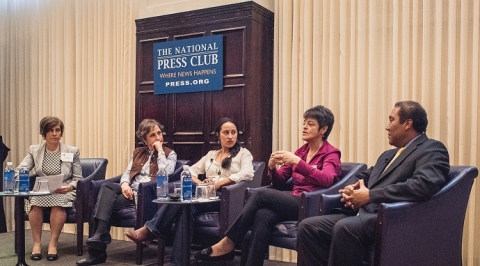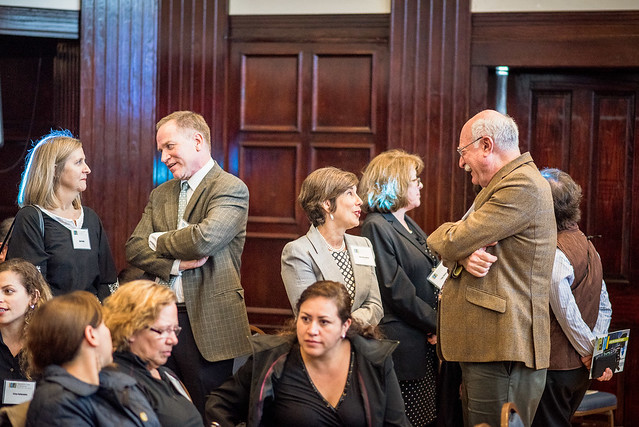
"When you publish something and it creates a change, that makes up for everything," said Guatemalan editor Ana Carolina Alpírez (second from right).
Latin American investigative journalists are collaborating in new ways to overcome obstacles such as fearful media owners, threats from drug traffickers, and crippling cyber-attacks, according to panelists at a recent International Center for Journalists event.
The discussion called "Transparency Trailblazers: Latin American Reporters Spotlight Crime and Corruption," featured three top women journalists--Carmen Aristegui of Mexico, Ana Carolina Alpírez of Guatemala, and Suchit Chávez of El Salvador--as well as ICFJ Senior Program Director Luis Botello, at the National Press Club. ICFJ President Joyce Barnathan served as moderator.
The speakers said that journalists in Central America will go as far as to submit their hard-hitting investigative stories on to their competitors, especially to independent online news sites, when their own news organizations refuse to publish the pieces for fear of angering politicians. They also said that they jointly publish stories across several media organizations to avoid putting one news organization at risk. And when their news sites are shuttered because of an online attack, they ask other organizations to carry these stories.
Mexican journalist Carmen Aristegui, anchor of a CNN en Español program and creator of her own news site, Aristeguinoticias.com, said a Mexican newspaper that had suffered serious threats from drug cartels refused to publish a story by one of its reporters. That piece revealed that a banker convicted of handling finances for a drug cartel had illegally received a contract valued at more than $22 million from a government anti-hunger program. The reporter quietly brought the story to Aristegui and her team, who checked it out and did their own reporting before publishing without using the reporter's name.
"This allowed us to protect that investigative story and make sure that citizens would know what, in other circumstances, simply would have remained hidden," she said. In another example, Aristeguinoticias.com was shut down by a cyber-attack after publishing a story that revealed a conflict of interest involving the Mexican first family. She got other organizations to publish the story, preventing the cyber-attack from killing it.
Alpírez, Chávez and members of Aristegui's team participate in ICFJ’s Latin American investigative reporting program, sponsored by USAID and the State Department. ICFJ has teamed up with Connectas, a Colombia-based organization, to foster cross-border investigations on issues such as government corruption, drug cartels and human rights abuses. ConnectasHub is a new platform that links investigative journalists from 15 countries, from the United States to Argentina. These connections allow journalists to multiply their impact by publishing pieces in several countries at once.
"Journalists initiate an investigation, and their media say no, they won’t dare to publish it," Botello said. "ConnectasHub has made certain that much information that otherwise would not be published at all, now is published not only in their countries but in other countries as well."
In introducing the panel, Barnathan said the initiative has trained 250 journalists in 44 news organizations. They have produced nearly 90 investigative projects, which together have uncovered about $19 billion in corruption and mismanaged funds. She also noted that investigative journalism is a dangerous field in Latin America. Twenty-seven journalists and media workers there were killed in 2015 (eight in Mexico), according to the International Federation of Journalists.
'We believe that this type of coverage serves the public interest by holding officials accountable," she said. "In our view, it is difficult to ensure good governance without a vibrant, independent news media that acts as a watchdog."
Chávez, an investigative reporter at La Prensa Gráfica in El Salvador, said that local news organizations work hard to protect their staff by ensuring that editors, police and local officials always know the whereabouts of journalists on a risky assignment. She said the training in the ICFJ program has also helped. "This kind of training creates a sense of cohesion, a feeling of shared knowledge," she said.
Despite threats, repression and meek media owners, the journalists said they have seen considerable impact from their stories. In Aristegui's case, the story on the Mexican president's conflict of interest was picked up by major media around the world and caused the government to cancel a lucrative contract with a company that had helped the first family buy a luxurious home. However, Aristegui and her team paid a steep price: the radio network where they worked fired them.
Alpírez, founder of the crowd-sourced investigative site Ojoconmipisto.com in Guatemala, said her pieces are increasingly making a difference. Her organization’s story on illegal dealings by a powerful Guatemalan mayor forced this official to resign. "We still work despite the threat of violence because we are journalists," she said. "When you publish something and it creates a change, that makes up for everything."
Check out a slideshow with photos of the gathering:
